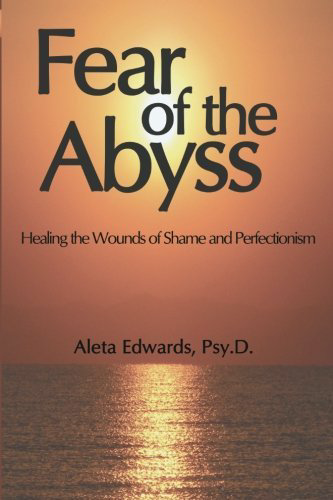Part of the Casswiki article series Books

Fear of the Abyss: Healing the Wounds of Shame & Perfectionism is a book by a clinical psychologist Dr. Aleta Edwards, first published in 2011.
This book deals with a kind of personality type, the problems that people of this type may have, and how they may resolve their issues and heal the underlying wounding. “PCS people” have among their typical traits Perfectionism, Control issues, and Shame - as well as black-and-white thinking, trouble with making decisions, fear of disappointment or of disappointing others, and some other characteristics. Underlying all this is a fear, unconsciously hidden from, of the self - of who and what one is. Rather than focusing on diagnoses, the author helps the reader to discover the root causes of a constellation of personality traits from which many have suffered.
The term PCS stands for perfectionism, control issues and shame, which would describe a type of personality. However, it is not a diagnostic label but a personality type. A PCS individual would have most of the traits that all go together rather than existing in isolation. And, these are considered to be “defenses” against the Abyss.
The “Abyss” is the fear of uncovering what is really there in an individual.
According to the author from her book:
Why should PCS people be this way?
I have found that, on a deeper level, people suffering from PCS dynamics have what I call a fear of the Abyss. They fear that should they let up on their rigid control, a very bad person, lurking within their dark side or Abyss, will be released and dominate their personality.
What they often fear is that they will become like some person, usually a parent or other important person in their early lives, some of whose habits or personality they abhor and feel they have within themselves. It is no wonder people with PCS complain of poor self-esteem. Feeling you have some kind of monster inside will not make anyone feel good - quite the opposite.
My clients with PCS issues always have this Abyss, like the workaholic who is afraid of being lazy, or the person who must stick to the exact truth at all times, even at the risk of offending others, because he fears becoming a liar. This fear of the Abyss is rooted in the mistaken belief that one must hide from a part of oneself at any cost to keep the lid on. It is a waste of energy going through life defending against these painful and scary feelings.
The Abyss is similar to what is known as “Shadow” in Jungian psychology, which may refer to an unconscious aspect of the individual which the conscious does not identify in themselves.
This book is highly recommended by FOTCM as it is a valuable tool for any individual who recognizes these types of issues, that they may have them in terms of just overcoming them and giving some control, essentially of their lives.
Further readings
- Cassiopaea Forum: Fear Of The Abyss - Aleta Edwards
- SotT Radio Show: Interview with Dr. Aleta Edwards, author of ‘Fear of the Abyss’
- Cassiopaea Forum: Show #38 - Dr. Aleta Edwards Interview: Fear of the Abyss
- Aleta Edwards, Psy.D. website
See also
- Black-and-white thinking
- Narcissism
